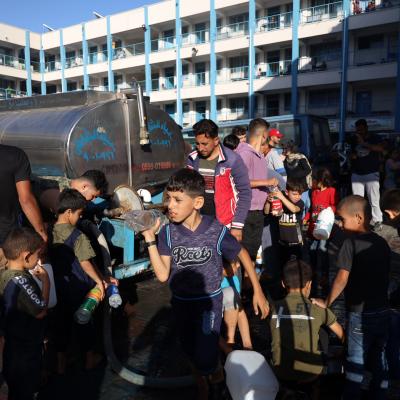Tensions Rise Between Israelis And Palestinians Over Water
Water Appears To Have Been "Weaponised"
28 Jul 2022 by The Water Diplomat
AMMAN, Jordan
As the Jordan Valley region is going through severe drought, tensions between Palestinians and Israelis are rising and protests have been held against water shortages in the month of July.
In an apparent action of weaponisation of water, there are reports that the Israeli Settlements Council has seized a Palestinian water tanker in the Jordan Valley. Local Palestinian authorities claim that several villagers and their cattle depend on the water tanker to provide them and their cattle fresh water while local Israeli settlements are not limited in the development of water infrastructure.
Elsewhere in the Jordan Valley, the village of Duma, surrounded by 3 settlements and an Israeli Defence Forces (IDF) camp is struggling to access drinkable water. Israel’s national water company Mekorot controls 42 water wells in the region, 34 of which were in Palestinian land in the Jordan Valley.
In response to calls from Palestinian authorities for Israel to sell them more water, the Israelis claim that Palestinians do not have the infrastructure to handle a bigger inflow. Accusing Mekorot of reducing the amount of water allocated Palestinians and instead, pumping it into Israeli settlements, dozens of Palestinian youths closed off the entrance to Bethlehem. Meanwhile, Israeli authorities, who prohibit Palestinians from drilling their own wells, claim it is up to Palestinian authorities to provide water for its citizens.
The region is struggling with water access and Jordanian Water Minister Mohammad Al Najjar has stated that 2022 has been the worst year on recorded Jordanian history for water access. While 500 m³/person/annum is regarded as the threshold below which the situation is considered to be of “absolute scarcity”, per capita water availability in Jordan now stands at 90 m³/person/annum.
In Jordan the situation is created by scarce rainfall and higher temperatures and is being worsened by an influx of refugees who are putting more strain on the country’s scarce water resources.
In an attempt to overcome the crisis, the Jordanian government has reached out to Syria requesting 30 million m³. However, Syria has refused this request on the grounds that the region is engulfed in drought, and it is also suffering from scarcity. Hazim El Nasser, Jordan’s Minister of Water and Irrigation, said in an interview: “Approximately 3 million refugees came to Jordan from Syria half of them Syrian citizens and half of them refugees from other countries; this movement of people increased our water demand by 21% in general, but in some areas like in the north the demand has been increased by 40%; this makes our life very difficult."
UNICEF has published a report entitled “Tapped Out — The Cost of Water Stress in Jordan”, detailing the country’s struggles with water access and how its most vulnerable groups are being affected.
Related Topics
11 Feb 2022 NEW YORK NY, United States
UN Middle East peace process official addresses UN Security Council and warns that region facesirreversible collapse and widespread instability; calls for two state solution.

25 May 2021 Tel Aviv, Israel
Aid agencies ramp up water aid to Gaza following ceasefire. Substantial damage to critical infrastructure leaves hundreds of thousands in need of humanitarian assistance. Rush to r...
27 Jun 2022 AMMAN, Jordan
Desalination capacity at heart of new agreement that doubles Israel's transfer of water to Jordan. Agreement met with optimism.
